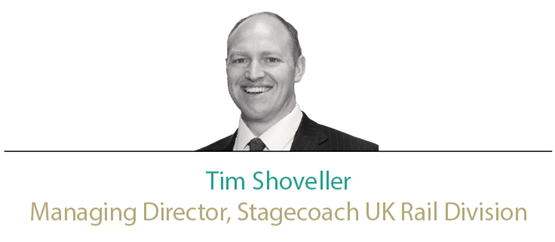
Rob certainly gives a straightforward account, and illustrates some of the challenges and opportunities that his role offers as a key leader in Network Rail, at this critical time for the railway.
Focusing first on the perpetual issue of NR’s organisation, Rob gives powerful examples of reasons for change. I would not disagree with any of the points made here to support the need for proper devolution, save for the major point on transforming the delivery, culture and economics of the industry. The feedback from passengers and stakeholders is clear - we need to be more radical and impatient.
The arguments are clearly made, my frustration is the lack of pace in progressing change. Remember that devolution was originally claimed to have been implemented by NR in all Routes in 2011, yet six years on authority is still not properly devolved.
Rob says: “It’s compounded by our legacy control hierarchy. Network Rail, quite rightly, does a lot of its assurance by control. It controls decisions centrally, and what that does is it makes the accountability difficult.”
I think Rob is being polite here. I am far from convinced that the current plans are sufficient, and the neutered authority of Route Managing Directors prevents the ownership and clarity that is evident in the TOC model, which has been very effective at driving down cost and improving safety (as noted in McNulty).
The new vision of further devolution is another step forward, but all this is taking too long. In the meantime, some very, very good NR employees are not able to contribute to their full potential, costs continue to rise, and opportunity is lost. Then there is the ultimate missed opportunity to improve the product we give our customers.
Moving on to the infrastructure itself, it was great to read Rob talking about the need for ‘system thinking’. I interpret this as meaning the ‘all the assets that create the system’, as opposed to the ‘whole railway network’.
I am convinced that the next tier of financial efficiency and service improvement will have to be led by ‘whole railway’ thinking - business cases that recognise the economic and safety impacts through the ‘railway system’, irrespective of owner or function. This does not mean that the organisation or ownership of the system has to be as one, but means very effective measures to align incentives and benefits. There is a big opportunity to do better in key safety capacity outputs to (in turn) improve the financial outcomes.
Recognising this and ensuring that all aspects are taken into account does allow a different view of priority, opportunity and aligns behaviours. This was, of course, a key element of Sir Roy McNulty’s report (some time before Shaw), yet we have not made sufficient progress in driving these changes to the incentives. CP6 is the next opportunity…
But sticking with the infrastructure. As Rob discusses, there has been progress here - driven by the first iteration of devolution - to develop a ‘local’ understanding of the condition of assets and how they work together at that location, with unique duty cycles and maintenance access to form the system.
How do we do better? In my view, it is no coincidence that the ‘total route modernisation’ approach has proved to deliver railways that provide excellent performance and customer delivery. I am convinced that ‘patch and mend’ just results in high costs of implementing schemes and does not deliver either performance or efficiency. Trying to interface modern technology into very old assets is like expecting something built when you listened to music on a gramophone to be compatible with an iPhone - it may be possible, but it’s not a good idea!
Which brings us to the challenges of running the LNE Route, critical to the success of the key Stagecoach Rail business of East Midlands Trains, Virgin Trains East Coast, and eventually Supertram’s operation to Rotherham.
Rob and his team certainly have their work cut out, but have worked hard to build positive relationships with the MDs of each business in what are clearly very challenging conditions. There is incredible diversity within the Route, and there is a lot to be done in order to allow the operators to deliver the promises that have been made to passengers, stakeholders and indeed the Treasury for the premia payments the Route enables. Taxpayers also stand to earn a huge benefit from franchise premia linked to the route. NR’s stewardship of the infrastructure is central to making that happen.
His illustration of the problems at King’s Cross are very honest. No one likes to be in this position, as the improvements are badly needed with significant passenger growth forecast based on the benefit from King’s Cross and the other schemes highlighted. Delay will reduce passenger revenue growth and cost the industry dear in the long run. It will also drive operating costs for the Route that were not budgeted to keep the old system running safely and reliably, so it’s bad news all round. But these are the decisions that need to be made locally, and one must respect Rob’s decision.
Perhaps of even greater concern is that King’s Cross is not alone, with other schemes being deferred for cost reasons. The early years of CP6 will have very large boxes at Feltham and Birmingham New Street, along with King’s Cross, all overdue. This is where the national co-ordination is necessary, and quickly! The ability to manage the scheme’s development and the supply chain’s capacity to respond to this challenge will be a major factor in the success (or otherwise) of 2019-20!











